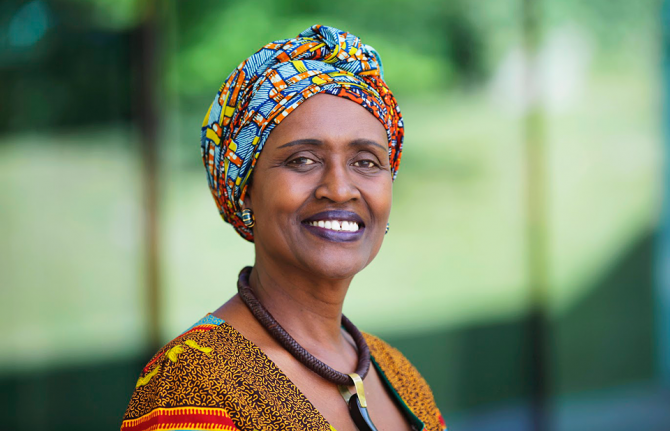

Press Statement
World AIDS Day 2022 — Message from Winnie Byanyima, Executive Director of UNAIDS
29 November 2022 29 November 2022World AIDS Day is a moment to honour over 40 million lives lost to AIDS, take stock of the AIDS response, and commit to ending AIDS.
This week we launched a powerful new report, Dangerous Inequalities. In it, we called the world’s attention to a painful reality: currently, we are not on track to end AIDS by 2030, and the reason is inequality.
But there is good news: by equalizing, we can end AIDS.
Firstly:
We must equalize for women and girls to reduce their HIV risks.
In sub-Saharan Africa, adolescent girls and young women are three times more likely to be infected with HIV than boys and men of the same age. The driving factor is inequality.
Enabling girls to stay in school until they complete secondary education reduces their vulnerability to HIV infection by up to 50%. When we include comprehensive sexuality education and other measures for girls’ empowerment then their risk is reduced even further. That is why 12 African countries have come together in the Education Plus Initiative, supported by the United Nations to make this happen.
Beyond this, we must combine services for sexual and reproductive health together with services for preventing and responding to sexual and gender-based violence and HIV.
They must be designed to work for all women and girls, in all their diversity.
We must equalize for marginalised people.
Discrimination against marginalised people is hurting the HIV response. Globally, gay men and other men who have sex with men are 28 times more likely to be infected with HIV. People who inject drugs have 35 times the risk, sex workers 30 times the risk, and transgender women 14 times the risk.
We will not end AIDS unless we can end it for everyone.
The evidence is clear: when you decriminalise, people will come forward for services. Decriminalisation saves lives.
Here are two examples:
In South Africa, where same sex relationships are legal, gay men are 60% more likely to be living with HIV but in Uganda where gay men are criminalized, they are 240% more likely.
In Thailand, where same sex relationships are legal, gay men are 11-times more likely to living with HIV than other men, but in Malaysia where gay men are criminalized, they are 72-times more likely.
But here is the good news. There is a growing momentum from Asia to Africa to the Caribbean, for decriminalizing same sex relationships. In recent years, Angola, Bhutan, and Botswana. In the past few months alone, St. Kitts and Nevis, Singapore, Antigua and Barbuda. In 68 countries these laws still exist. Let’s consign these harmful and colonial laws to history.
But we don’t only need to decriminalise, we need to fight stigma.
Stigma is the sentence passed by society on people for who they are. And it kills.
We need to end stigma for people living with HIV and for marginalised communities. We need every leader – political leaders, faith leaders, traditional leaders, cultural leaders.
Rise. Equalize.
Thirdly:
An inequality that breaks my heart is that against children living with HIV. With the science that we have today, no baby should be born with HIV and no child who has HIV should be without treatment. But today, while three quarters of adults living with HIV are on treatment, only half of children are. This is intolerable.
We will not allow this shameful and avoidable injustice to continue. That is why the United Nations, international partners, civil society and governments from the 12 countries with the highest burden have come together and formed the Global Alliance to end AIDS in Children. We are moving. Tanzania will host the official launch early next year.
Lastly and crucially.
To end AIDS, we must tackle the inequalities in resourcing.
The COVID-19 crisis and the war in Ukraine have increased inequality worldwide. Every day, G20 countries receive 136 million dollars in debt repayments from poor countries in the South. Meanwhile in these countries debt repayments are 4 times more than they spend on health and twice what they spend on education.
In the midst of a crisis of debt, austerity and inequality hitting developing countries, some rich countries have cut back aid for global health and are considering even deeper cuts.
This is not right. Now is not the time to step away, it is the time to step up.
Remember: it is through international solidarity that we reduced inequalities in financing and made amazing gains against AIDS including bringing more than 28 million people onto life-saving treatment. And we must complete the job.
On World AIDS Day, UNAIDS joins with people living with HIV and communities around the world in one shared call to action: Equalize.
Equalize access to rights, equalize access to services, equalize access to resources, equalize access to the best science and medicine.
This is how we will end AIDS.
UNAIDS
The Joint United Nations Programme on HIV/AIDS (UNAIDS) leads and inspires the world to achieve its shared vision of zero new HIV infections, zero discrimination and zero AIDS-related deaths. UNAIDS unites the efforts of 11 UN organizations—UNHCR, UNICEF, WFP, UNDP, UNFPA, UNODC, UN Women, ILO, UNESCO, WHO and the World Bank—and works closely with global and national partners towards ending the AIDS epidemic by 2030 as part of the Sustainable Development Goals. Learn more at unaids.org and connect with us on Facebook, Twitter, Instagram and YouTube.
